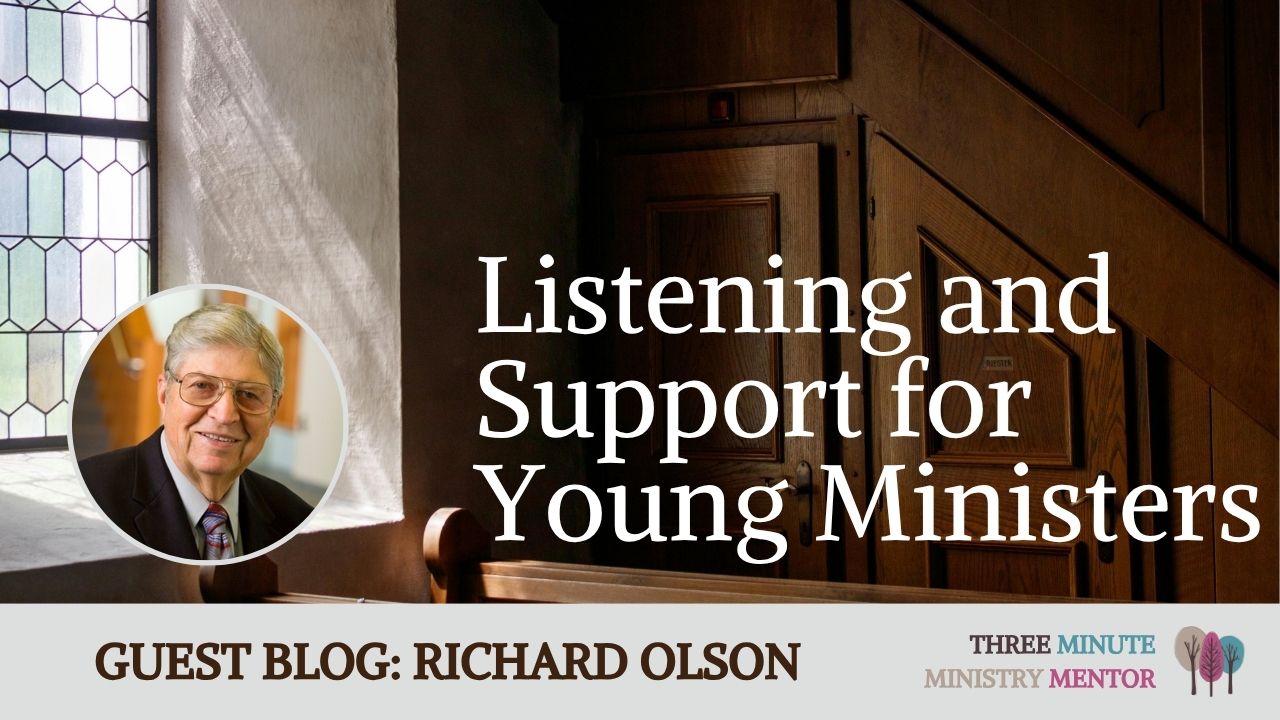Editor’s note: This week we welcome Dr. Richard Olson as our guest. Richard helps us pay attention to the voices and needs of young clergy. A retired pastor, pastoral counselor, and professor of pastoral theology, Richard aspired to be a caring presence, leading the church to be a caring community, and helping his students to be compassionate leaders and caregivers.
Listening and Support for Young Ministers
As I was doing research for my book Rowing Together Through the Rapids: Hopeful Conversations for Today’s and Tomorrow’s Church, I sought insight from the past and wisdom for the present and future. I was rueful that despite my colleagues and my best effort, we left our twentieth century pastorates diminished and shrinking.
But I also wanted to know about the future, including how the present generation of ministers was doing. I looked for “Gen X” and “Millennial” pastors to interview. I found about thirty of them, and I sent a list of questions. Then I talked with each of them on the phone for an hour or sometimes much more.
Scholars of the church note at least three trends in the present and near future: a growth of part time pastoral positions; shrinkage and adaptations with buildings too old and too large; and serving during a church closure. Indeed, I heard some discouragement among these pastors.
I also heard encouraging responses, including ways to keep going and be creative in these challenging times. Here are some ways ministers are thriving in the midst of challenges:
Creative Healing
David (on his healing after his church closed and dismissed him): “Reading, listening to a lot of music, being outside, riding my bike, seeing all nature had to offer, meditation, finding ways to ease my mind as much as I could.”
Sabbatical
When I asked Jason what he did on his sabbatical, he told me, “I had stopped reading theology for fun. [So] I flexed my theological muscles. I bought and read books I hadn’t read, took a course on interim ministry, went on a trip to see family and relatives we hadn’t seen in years, got our house ready to sell and move into larger quarters. This restored me and my love of ministry.”
Friendship
Jessica and others are sustained by friendships, including with the congregation they serve. Jessica: “I was reluctantly called by a church that wasn’t sure about a woman pastor. My role is to be pastor to people who are hurting, and my congregation appreciates me. They ask if I have had a break lately. They sent me to our denominational gathering in Puerto Rico. One family so insisted I come to their family reunion that I guess I am part of their family now. We care for one another.”
Humor and Play
As Susan Sparks noted, “Laughter is the GPS system for the soul. . . Laughter heals. It grounds us in a place of hope.”
Faith
Debbie works with a congregation with disabilities (deaf and hard of hearing), a condition she shares. It has been hard going, with financial challenges and theological tensions. I asked her what keeps her going. She responded, “I believe it is my calling. It is the work of the Holy Spirit. Otherwise, I think I would be totally and utterly out of commission, if I didn’t have the work of the Holy Spirit in me, working me, pushing, driving, encouraging, calming, putting a fire under me. As Christ said, the Holy Spirit is a gift, and boy is it.”
A pastor named Randy spoke of faithful worship leading, “I hunger to be led by the Spirit. Personally, I can’t change people, but I bring them to God who can change them.”
Extending Support to Young Ministers
In addition to stories about what sustains these younger pastors, I also learned some important ways to listen, appreciate, and learn from them. Here are ways we can be part of supporting ministers:
Conversation
I felt surprised by the intense conversations. I always sent a thank you for talking with me. Almost always, I learned they enjoyed this as much as I did. How good it was to be listened to about their lifework. A couple of them said they saw their ministries in a new light after we talked.
Sensitivity
We can pay attention to where ministers are: life stage, available time, competing employment or activities. etc. Consider Edris, part-time pastor of a small congregation and stay-at-home mom. She told me, “I was the first female pregnant pastor in my whole association of churches! I was treated very well during that pregnancy—provided maternity leave, something like up to twelve weeks—with full pay. They threw me a surprise baby shower. They were open to my bringing the baby to meetings and church events, but not too happy when I chose to breastfeed (I always covered up).” For the most part, she feels accepted in her dual roles of parent and pastor.
Respect, Affirmation, and Openness to God’s Future
I am in my 90s, and I look it! But for these conversations I was the eager student, and the ministers responded with candor. It became a source of renewal for both of us. I would welcome many of them as my pastor and guide into our future.





